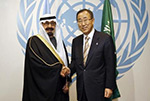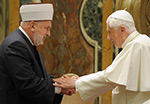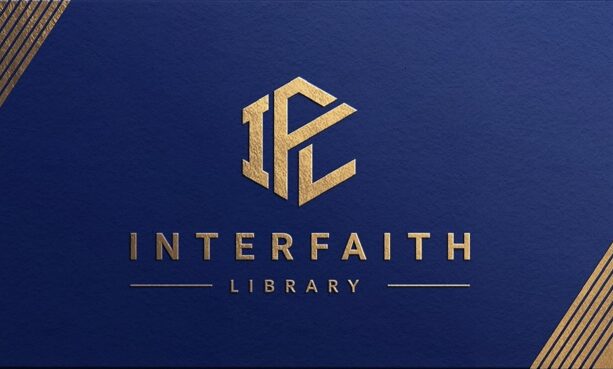The power of religion can be used as a major force of unification among divergent factions, and hence it can play a key role in the promotion of global peace and reconciliation, by bringing varying groups together in order to establish and maintain constructive channels of communication and sustainable collaboration.
Interfaith dialogue therefore plays a vital role in the field of Cultural Diplomacy, as it can advance world peace by uniting faiths and by fostering reciprocal understanding, acceptance and tolerance amongst disparate religious communities.
Inter-faith dialogue can in this way break down walls of division and the barriers that stand at the center of numerous wars, with the objective of achieving peace.
Interfaith Library was created to put a new and fresh spin on what others have done or tried to do in the past. What’s unique about this interfaith foundation is that EVERYONE can be apart of this idea, (not just scholars and religious leaders) and can contribute and interact without fear that was created because of indifferences. Let revisit some interfaith works from the past. In so reviewing, you will see why Interfaith Library was necessary. It’s a place where everyday ordinary people have a voice.
1964
PONTIFICAL COUNCIL FOR INTERRELIGIOUS DIALOGUE (PCID)
Speaking, listening, giving and receiving for mutual growth and enrichment through Inter-Religious dialogue, founded in 1964

The PCID is the central office of the Catholic Church for promoting interreligious dialogue in accordance with the spirit of the Second Vatican Council, in particular the declaration Nostra Aetate.
1970
9TH WORLD ASSEMBLY OF RELIGIONS FOR PEACE (2013)
A multi-religious organization aims at sharing a vision of peace through mutual understanding

Religions for Peace, the organizer of the conference held in Vienna in November 2013, are the world’s largest multi-religious organization. Each religion represented in the organization is respected as being held sincerely by the believers of that religion. The aim of the conference was to discern and express elements of a shared positive vision of peace through the finding of shared values and consensus among common elements.
1978
INTERFAITH CONFERENCE OF METROPOLITAN WASHINGTON
Advancing justice, building community and nurturing understanding between different cultures and generations

Created in 1978, the InterFaith Conference of Metropolitan Washington (IFC) brings together eleven historic faith communities to promote dialogue, understanding and a sense of community and to work cooperatively for social and economic justice through the DC region. IFC members currently include the Baha’i, Buddhist, Hindu, Islamic, Jain, Jewish, Latter-day Saints, Protestant, Roman Catholic, Sikh and Zoroastrian faith communities.
2002
EUROPEAN COUNCIL OF RELIGIOUS LEADERS
A European platform which calls for actions to promote peaceful and fruitful coexistence for people inside and outside borders

European Council of Religious Leaders was founded in Oslo in 2002 and it is part of a more comprehensive coalition called Religions for Peace. The Council is built on the belief that dialogue and cooperation has a value in itself, and the Council has a leading role in promoting both cooperation and dialogue within the European region.
2007
THE UN HIGH-LEVEL DIALOGUE ON INTERFAITH COOPERATION FOR PEACE
Intercultural and Interfaith Understanding and Cooperation for Peace in the UN

The General Assembly, in its resolution 61/221 of 20 December 2006, decided “to convene in 2007 a high-level dialogue on interreligious and intercultural cooperation for the promotion of tolerance, understanding and universal respect on matters of freedom of religion or belief and cultural diversity”.
2008
FIRST MEETING OF THE CATHOLIC – MUSLIM FORUM
Pope Benedict meets with Muslim scholars and religious leaders

From 4th to 6th November 2008, an unprecedented three-day Catholic-Muslim summit was held at the Vatican, with leaders of both religions hoping to bring a deeper understanding between the two biggest world religions. The annual meeting includes more than 50 participants and is structured as a mostly closed-door workshop amongst scholars.
2010
INTERRELIGIOUS DIALOGUE CONFERENCE
Discussing the functions, rights and responsibilities of religious bodies in a society where religion is often perceived as the embodiment of fundamentalism

Young Jewish, Muslim and Christian professionals discussed projects and cooperation between faith-based organizations at the Interreligious Dialogue Conference in Seville in 2010. The conference was aimed at developing best practices in the intricate field of interreligious dialogue.
All of these previous efforts simply paved the way for Interfaith Library to be born and become the voice of today’s multi-faith based community.

With any peace, there has to be a dialogue between one, two, or many factions. If there is no dialogue then the discussion of peace is none and void. The room for advancement and understanding is a closed door that can never be open unless one takes his hand and turn the door knob of opportunity. The interfaith community has not only opened the door knob, but unlock the deadbolt with hinders humanity from genuine peace and love.
Christopher, thank you for your thoughtful comment. Yes, we are all opening doors in this work that brings us together. As we unlock and open those doors, we find wonderful people of all faiths in the larger room of humanity. By graciously listening and speaking with humility, we continue to grow our interfaith community. We are so glad and honored to have you join us. Keep opening those doors.
I realize that this may be a bit off topic, but this blog did stress that we should talk to one another so we may learn about one another. I am a Christian but I sometime struggle with the fact that the church controls the narrative when it comes to how Christians are suppose to believe. Saying that, can the library elaborate on why the church chose to canonize the four Gospels and discard others. Disregarding the various gospels that were not canonize creates in me a major quandary. I’ve read a few books of the Apacrypha and found them to be quite interesting and informative. Why would they hide this kind of information from people like me?
Hello Cliff. Thx for visiting our library. The creation of the library was established for people like you. It’s a safe place to ask difficult question and to have respectful difficult discussion. With that said, which book/s of the Apocrypha have your read? Tobit, Judith, Solomon’s Wisdom, Jesus ben Sira’s Wisdom (Sirach), Baruch, Jeremiah’s Letter (Chapter 6 of Jeremiah in the Vulgate), additions to Daniel (The Prayer of Azarias, Susanna, and Bel and the Dragon), additions to Esther, 1 Maccabees, 2 Maccabees, 3 Maccabees, 1 Esdras, i.e.? This will help us better understand your struggle.
The subject of the Apocrypha can be difficult and detailed, but this response should simplify matter. To speak in brief terms, there are doctrines and practices contained in the Apocrypha that are contrary to what the Canonized Scripture teaches. One main example, they teach that a person is Saved by “works”. Not too different then the Islamic understanding of salvation. “For almsgiving saves from death and purges away every sin. Those who give alms will enjoy a full life.” (Tobit 12:9) As opposed to, “For by grace you are saved through faith, and this is not your own doing; it is the gift of God – not the result of works, so that no one may boast.” (Ephesians 2:8,9) There is more reasons but this is just one. Because you asked, we will post a blog on this subject soon. Be on the lookout. Thanks for the question and sharing that you are in the pursuit of clearer understand within your the faith. Be well and Favored.